*** Special to The BRAD BLOG
*** by Libby/CIA Leak Trial Correspondent Margie Burns
As the congressional report released in 2004 (referenced in previous blog) makes clear, if U.S. intelligence agencies were unable to connect Iraq to weapons of mass destruction before the war, it was not for lack of trying.
From May 2002 to September 2002, five documents were produced by the intelligence community pertaining to Iraq WMDs. A CIA briefing book prepared on May 10, a Department of Energy (DOE) intelligence report on July 22, and a Defense Intelligence Agency (DIA) intelligence assessment in September all mentioned the Niger uranium issue, although the DOE report included caveats. The US embassy in Niger cabled on June 24, 2002, about an IAEA (International Atomic Energy Agency) agreement safeguarding Niger uranium. A CIA paper was published on August 1, 2002, titled ‘Iraq’s Reemerging Nuclear Program,’ but did not mention Niger uranium. (48)
As noted in the previous blog on this topic, investigation had ruled out any threat from Niger uranium in regard to Iraq. Evidently these efforts were not good enough. In September and October 2002, according to the Senate Select Intelligence Committee report, the White House contacted the intelligence community at least five times to clear language regarding alleged Iraqi efforts to purchase uranium. On September 11, 2002 – the first anniversary of 9/11 --- the NSC asked the CIA to clear uranium language for inclusion in a possible statement by Bush...
However, “The President never used the approved language publicly.” (49) On September 24, 2002, National Security Council (NSC) staff under National Security Adviser Condoleezza Rice sought to clear a statement including the yellowcake item, but again, “The President did not use the cleared language publicly.” (51)
On October 4, 2002, the NSC sent over a (sixth) draft of a speech for Bush to deliver in Cincinnati that included the uranium allegation. An analyst session coordinating on the speech the next day raised concerns about the language; later that day, a seventh draft was sent over, still including the uranium item. This time, the CIA analyst called Director George Tenet directly; Tenet called Deputy National Security Advisor Stephen Hadley, and the item was removed. On September 7, Bush delivered the Cincinnati speech without the uranium language, and success – analytically speaking – had been snatched from the jaws of defeat. However, the same day, the CIA had to prepare “comments on a draft White House paper, A Grave and Gathering Danger,” which again included the uranium item. For whatever reasons, “The White House did not publish the paper.” (55-57)
The Senate report concludes blandly that there was no pressure on the CIA. Sure. No political pressure there: if the White House did not use the uranium language cleared for it, then what purpose could these behind-the-scenes approaches have had, other than to pressure the intelligence community?
On October 9, 2002, the now-famous forged documents purporting to show an Iraq-Niger uranium deal, surfaced in Rome. The documents, in the hands of a journalist who had paid for them, were given to the US embassy in Rome. The embassy passed them on to the State Department and the CIA within two days. The INR (Bureau of Intelligence & Research), in the State Department – which as previously written played a rather heroic role in demurring at the war pretexts put forward by the White House --- seems to have been immediately suspicious. Copies were made available to the other agencies at an October 16, 2002, meeting, and the CIA inspector general later found copies in the CIA vault, filed “without any further distribution.” (57-58) The CIA apparently received the forgeries directly only on January 16, 2003. (62) In other words, the CIA evidently knew early on that these documents could be disregarded.
Attempts by the White House to get Iraq-uranium language cleared intensified, over the months leading up to the State of the Union address with its 16 words, with increasing success. In fact, it looks as though much of the intelligence community, aside from the INR, was basically throwing in the towel. On December 17, 2002, intelligence analysts produced a paper for the NSC, responding to Iraq’s disclosure on its WMD programs to the UN. The paper mentioned the uranium allegation, without including caveats. “An e-mail from the INR Iraq nuclear analyst to a DOE analyst . . . indicated that the analyst was surprised that INR’s well known alternative views” were left out. (60)
On December 18, 2002, the State Department requested a “fact sheet” to respond to Iraq’s UN statement, to be published after UN Ambassador John Negroponte delivered a speech to the UN Security Council the next morning. Later the same day, a Nonproliferation special assistant drafted the fact sheet, and sent it to the intelligence community; the mention of uranium was included, and not discussed by intelligence analysts, i.e. debunked. The “fact sheet” draft was based on a draft of Negroponte’s speech! (60)
“Separately, the NSC staff coordinated the Negroponte speech directly with [an analyst] and he recommended that ‘Niger’ be replaced with ‘Africa’ in the speech.” (61)
So the only correction inserted by the CIA at this point was just to broaden ‘Niger’ to ‘Africa’ --- making the item harder to refute. In a behind-the-scenes rush, the INR did note its caveats to the language of the speech draft and recommended changes. Unfortunately, nobody told the INR that there was a deadline. Negroponte’s speech had already been delivered, and the “fact sheet,” with the uranium allegation, had been posted on the State Department web site, before changes recommended by the INR made their way through channels. (61)
“On December 24, 2002, the Nigerian Prime Minister declared publicly that Niger had not sold uranium to Iraq and had not been approached since he took office in 2000. Niger’s President and Minister of Mines also denied the sale.” (61)
On January 13, 2003, the INR Iraq nuclear analyst sent an e-mail to several IC analysts outlining his reasoning “why the uranium purchase agreement probably is a hoax.” When the CIA analyst received the e-mail, he realized he did not have the documents referred to; three days later, the CIA received copies of the forged documents. (62)
On January 15, 2003, 13 days before the State of the Union address, CIA analysts again tried to broaden language in ‘A Grave and Gathering Danger,’ from the White House, to say Africa rather than Niger. The paper was never published. On January 17, 2003, 11 days before the State of the Union speech, the analysts published an Iraq paper for the Joint Chiefs of Staff that included the uranium allegation. (62)
On January 20, 2003, Bush submitted a report to Congress about Iraq WMD noncompliance, including uranium. “The CIA and the White House have told Committee staff that the IC did not coordinate on this draft.” It might be enlightening to know who wrote this report.
On January 24, 2003, upon request from the NSC about WMDs, the CIA “faxed a packet of background information to the NSC,” including the uranium item. Also on January 24, the DIA provided a background paper on the Niger item to the Office of the Secretary of Defense/International Security Affairs, without caveats. On January 26, Secretary of State Colin Powell gave a speech at the World Economic Forum, asking why Saddam was still trying to purchase uranium. (63-64)
“On January 27, 2003, the DCI was provided with a hardcopy draft of the State of the Union address at an NSC meeting” to vet, one day before the SOTU speech. Tenet testified in July, 2003, that he never read the speech; no one recalls who the contact person for the speech was, if there was one. There was at least one phone conversation between the NSC and the intelligence analysts about the uranium language, but no one can remember who initiated the call (64), and there are disagreements about the draft wording. On January 28, 2003, Bush delivered his State of the Union address, including the uranium reference but attributing it to the British, and referring to Africa rather than to Niger specifically. (64-66)
The Committee report shows how big the CIA is, with separate halls, niches and crannies where war boosters and war opponents could both find support for their positions. Too bad the more rational side lost; clearly it was destined to lose and, as former CIA officers like Ray McGovern have said, intelligence-gathering has been subordinated to policy.
Meanwhile, the INR tried to do its job. It is to be hoped that an INR analyst did not pay for the effort, one way or another, with his life.
[This article excerpted from a longer piece published previously.]


 It's About Elections and the Windmills of His Mind: 'BradCast' 1/29/26
It's About Elections and the Windmills of His Mind: 'BradCast' 1/29/26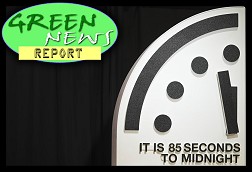 'Green News Report' 1/29/26
'Green News Report' 1/29/26
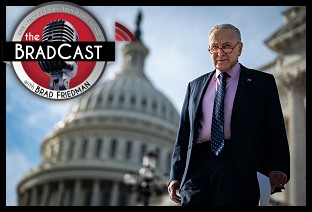 Govt Shutdown Over ICE Funding Near Certain This Weekend: 'BradCast' 1/28/26
Govt Shutdown Over ICE Funding Near Certain This Weekend: 'BradCast' 1/28/26 Trump Blinks, Bovino Out, MN Op Falters but Continues as Midterm Accountability Looms: 'BradCast' 1/27/26
Trump Blinks, Bovino Out, MN Op Falters but Continues as Midterm Accountability Looms: 'BradCast' 1/27/26 'Green News Report' 1/27/26
'Green News Report' 1/27/26 The ICE Murder of ICU Nurse Alex Pretti and the Heroes of Minneapolis: 'BradCast' 1/26/26
The ICE Murder of ICU Nurse Alex Pretti and the Heroes of Minneapolis: 'BradCast' 1/26/26 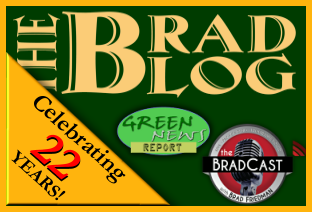 The BRAD BLOG: 22 Years and Still Counting
The BRAD BLOG: 22 Years and Still Counting Sunday 'Worth a Thousand Words' Toons
Sunday 'Worth a Thousand Words' Toons Mr. Smith Testifies (Publicly) in Washington: 'BradCast' 1/22/26
Mr. Smith Testifies (Publicly) in Washington: 'BradCast' 1/22/26 'Green News Report' 1/22/26
'Green News Report' 1/22/26 World Turning Against Self-Destructing U.S. Under Trump: 'BradCast' 1/21/26
World Turning Against Self-Destructing U.S. Under Trump: 'BradCast' 1/21/26 Trump Admin Waste, Fraud, Abuse on Voting, at DOJ, by DOGE: 'BradCast' 1/20/26
Trump Admin Waste, Fraud, Abuse on Voting, at DOJ, by DOGE: 'BradCast' 1/20/26 'Green News Report' 1/20/26
'Green News Report' 1/20/26 Sunday 'Domestic Terrorist' Toons
Sunday 'Domestic Terrorist' Toons 'Green News Report' 1/15/26
'Green News Report' 1/15/26 'A Cornered Rat': Trump Terrorizes Minneapolis, Menaces NATO, World: 'BradCast' 1/15/26
'A Cornered Rat': Trump Terrorizes Minneapolis, Menaces NATO, World: 'BradCast' 1/15/26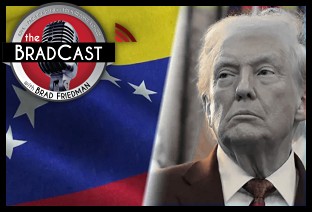 'Not Close to Over': Mad King Trump in Venezuela (& Beyond): 'BradCast' 1/14
'Not Close to Over': Mad King Trump in Venezuela (& Beyond): 'BradCast' 1/14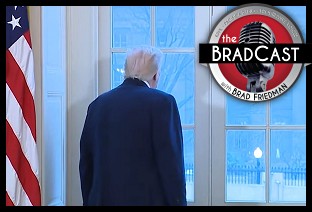 Things Getting Weirder as Trump Keeps Losing: 'BradCast' 1/13/26
Things Getting Weirder as Trump Keeps Losing: 'BradCast' 1/13/26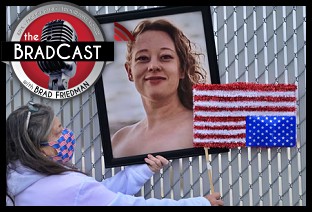 After ICE Murder in MN, Local Cops Disown Fed Policing Practices: 'BradCast' 1/12/26
After ICE Murder in MN, Local Cops Disown Fed Policing Practices: 'BradCast' 1/12/26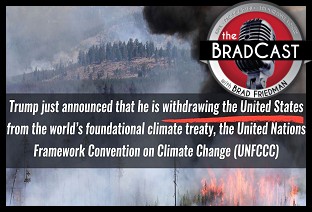 Trump to Congress, Climate, U.N., Rule of Law: DROP DEAD - 'BradCast' 1/8/26
Trump to Congress, Climate, U.N., Rule of Law: DROP DEAD - 'BradCast' 1/8/26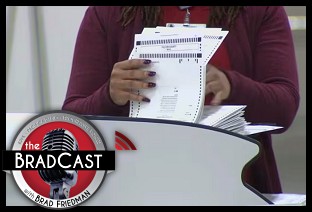 'Nonsense': Trumpers Claim 315k Fraudulent GA Votes in 2020: 'BradCast' 1/7/26
'Nonsense': Trumpers Claim 315k Fraudulent GA Votes in 2020: 'BradCast' 1/7/26 Jack Smith Testimony on Trump J6 Crimes, DOJ Weaponization: 'BradCast' 1/6/26
Jack Smith Testimony on Trump J6 Crimes, DOJ Weaponization: 'BradCast' 1/6/26 Trump War on Venez. is About Ego, Power, 'Alien Enemies Act': 'BradCast' 1/5/26
Trump War on Venez. is About Ego, Power, 'Alien Enemies Act': 'BradCast' 1/5/26
 VA GOP VOTER REG FRAUDSTER OFF HOOK
VA GOP VOTER REG FRAUDSTER OFF HOOK Criminal GOP Voter Registration Fraud Probe Expanding in VA
Criminal GOP Voter Registration Fraud Probe Expanding in VA DOJ PROBE SOUGHT AFTER VA ARREST
DOJ PROBE SOUGHT AFTER VA ARREST Arrest in VA: GOP Voter Reg Scandal Widens
Arrest in VA: GOP Voter Reg Scandal Widens ALL TOGETHER: ROVE, SPROUL, KOCHS, RNC
ALL TOGETHER: ROVE, SPROUL, KOCHS, RNC LATimes: RNC's 'Fired' Sproul Working for Repubs in 'as Many as 30 States'
LATimes: RNC's 'Fired' Sproul Working for Repubs in 'as Many as 30 States' 'Fired' Sproul Group 'Cloned', Still Working for Republicans in At Least 10 States
'Fired' Sproul Group 'Cloned', Still Working for Republicans in At Least 10 States FINALLY: FOX ON GOP REG FRAUD SCANDAL
FINALLY: FOX ON GOP REG FRAUD SCANDAL COLORADO FOLLOWS FLORIDA WITH GOP CRIMINAL INVESTIGATION
COLORADO FOLLOWS FLORIDA WITH GOP CRIMINAL INVESTIGATION CRIMINAL PROBE LAUNCHED INTO GOP VOTER REGISTRATION FRAUD SCANDAL IN FL
CRIMINAL PROBE LAUNCHED INTO GOP VOTER REGISTRATION FRAUD SCANDAL IN FL Brad Breaks PA Photo ID & GOP Registration Fraud Scandal News on Hartmann TV
Brad Breaks PA Photo ID & GOP Registration Fraud Scandal News on Hartmann TV  CAUGHT ON TAPE: COORDINATED NATIONWIDE GOP VOTER REG SCAM
CAUGHT ON TAPE: COORDINATED NATIONWIDE GOP VOTER REG SCAM CRIMINAL ELECTION FRAUD COMPLAINT FILED AGAINST GOP 'FRAUD' FIRM
CRIMINAL ELECTION FRAUD COMPLAINT FILED AGAINST GOP 'FRAUD' FIRM RICK SCOTT GETS ROLLED IN GOP REGISTRATION FRAUD SCANDAL
RICK SCOTT GETS ROLLED IN GOP REGISTRATION FRAUD SCANDAL VIDEO: Brad Breaks GOP Reg Fraud Scandal on Hartmann TV
VIDEO: Brad Breaks GOP Reg Fraud Scandal on Hartmann TV RNC FIRES NATIONAL VOTER REGISTRATION FIRM FOR FRAUD
RNC FIRES NATIONAL VOTER REGISTRATION FIRM FOR FRAUD EXCLUSIVE: Intvw w/ FL Official Who First Discovered GOP Reg Fraud
EXCLUSIVE: Intvw w/ FL Official Who First Discovered GOP Reg Fraud GOP REGISTRATION FRAUD FOUND IN FL
GOP REGISTRATION FRAUD FOUND IN FL

































